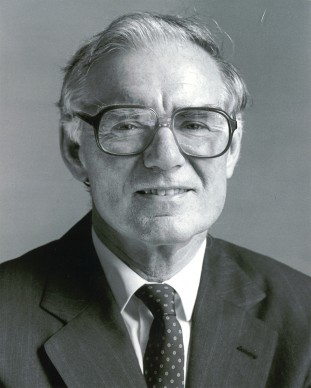
The "Golden Years” and Expansion of the University System
The late 1960s and the 1970s are often fondly remembered as the “golden years” of post-secondary education in Ontario, because the largest expansion of the province’s university system to date took place during this period. In the new Ministry of Colleges and Universities, more than 900 government employees now focused on the needs of the higher-education sector.
The expansion of the post-secondary educational system occurred under Premier John Robarts’s Progressive Conservative government, aided by his Education Minister, Bill Davis. Davis, in turn, was Ontario’s Premier from 1971 to 1985.
Helen Breslauer
Financing the expansion
A new provincial system to finance the expansion was established: For every registered student, a university would receive funding corresponding to a formula designed around the “basic income unit,” or BIU. As well, additional funding envelopes were distributed to help account for the unique needs of parts of the system, such as the higher costs of running universities in the north, or the requirements of bilingual institutions.
Construction of Robarts Library, 1968. There was an enormous expansion of the university system in the late 1960s. University of Toronto Archives
2007-33-4MS.OCUFA expands its role
As the post-secondary sector expanded, so too did OCUFA’s role. Although CAUT — the Canadian Association of University Teachers — was already an active organization focused on the federal arena, education was a provincial responsibility, and it became increasingly clear that a strong provincial advocate was needed to help Ontario’s faculty associations lobby effectively.
More staff were hired for management, research, and administrative positions. And, in 1968, Charles Hanly came on board as OCUFA’s first Executive Vice-Chair. He was succeeded by Greg Bennett in 1973, Graham Murray in 1976, and Patrick Wesley in 1979.
OCUFA also responded to these changes through an internal restructuring process that began in 1979. A “Statement of the Rationale for Change in OCUFA” laid out the organization’s focus moving forward:
OCUFA should serve as an intelligence source , passing information on relevant events and inchoate developments to local associations …. Secondly, it should serve as a conduit of communication and influence from representatives of local faculty constituencies to appointed officials , politicians and the media…. Thirdly, it should be — and be seen to be — a central voice for the professoriate of Ontario …. Fourthly, it should — through advice and example — strengthen the will and capability of its constituent associations in identifying and coping with problems at the local level. Finally, OCUFA should protect the well-being of the professoriate….
A number of new (and a few longer-standing) committees were also struck during this time, including Teaching Awards (1973), Salaries (1967), Pensions (1967), and Status of Women (1972; disbanded in 1974; re-formed in 1984). A few other committees were shorter-lived, including Teacher Evaluation (1971–73), and Educational TV (1970–72).
Charles Hanly, OCUFA’s first
Executive Vice-Chair.
On the whole, the policy that affected the universities from the early ’70s on is best described as occasionally qualified austerity. The provincial government found that there were other areas that either had better claim on the money or made a more insistent claim on the money, particularly health.... In the early ’70s, OCUFA was still a relatively young organization when I became aware of it. And its chief function then, I believe, was to be a clearinghouse of information and an office where at least we could formulate a document that you could take to the Ontario Council on University Affairs, to let them know what our position on different issues was.
OCUFA President 1976–77
Michiel Horn
At the beginning, we were trying to find our way in a new world. Back then, OCUFA’s chief function was as a clearinghouse of information and an office where we could formulate a document that you could take to the Ontario Council on University Affairs; whatever happened after that of course you couldn’t control.
OCUFA President 1976–77
Michiel Horn






